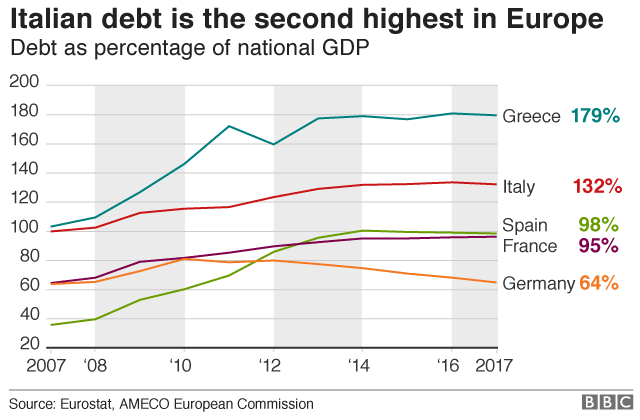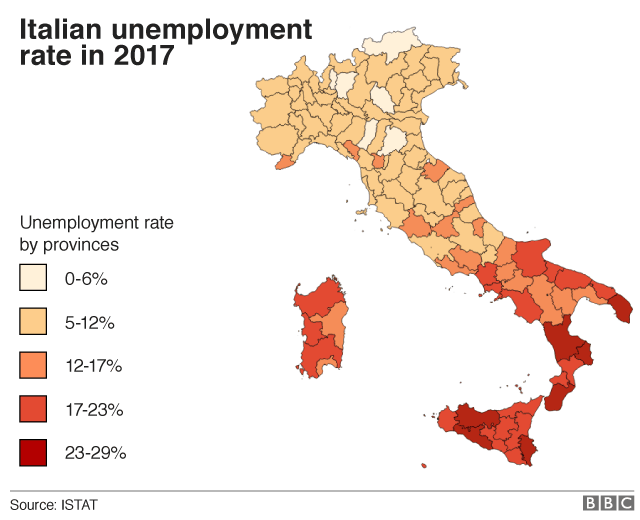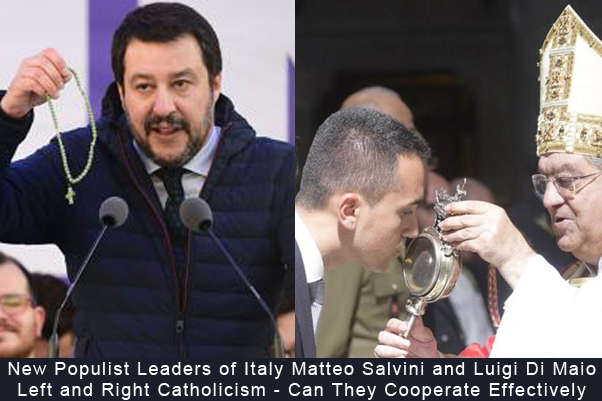Newera Global Intelligence Report:
ITALY HAS TAKEN A MAJOR STEP into the future. Governed by a new coalition of two populist parties (“Northern League” and “Five Star”) the beleaguered nation has taken its first major step away from liberalism and EU diktat toward national sovereignty. Following Austria in Central Europe and Poland and Hungary in Eastern Europe, Italy is the first Western European country to elect populist leaders committed to much needed systemic economic, political and cultural change. As such, it did not take long for liberal billionaire financier and philanthropist,George Soros to drum up the his brand of conspiracy theory invoked whenever Christians get elected – Putin did it:
“There is “a strong threat and I’m really worried” says Soros. “There is a close relationship between Matteo Salvini and [Russian President Vladimir] Putin… I do not know if Putin actually finances his party, but Italian public opinion has the right to know if Salvini is in Putin’s pay check.”
Emanuele Fiano, deputy of the ousted Democratic Party, also weighed in on the debate, telling Radio Cusano Campus listeners that:
“Parliament should have some more certainty about the relations between the League, M5S and Russia.”
Matteo Salvini, head of the newly elected Northern League, strongly denied the allegations:
“I have never received a lira, a euro or a rouble from Russia,” adding, “I am ashamed that a speculator like him is invited to speak” at the Trento Festival of Economics.”
Soros’ rhetoric is worn and increasingly ineffective; Italy’s problems will not be solved by giving time to his brand of dying liberalism . Italy stands in dire need of an alternative economic plan that could very well emerge throughout the Peninsula. Although the third largest economy in the European Union, and historically a major player in both European and world affairs, Italy is racked with overwhelming economic challenges effecting its current and future stability. Italian debt is now the second highest in Europe after Greece – it has reached 132% of GDP.

Italy is suffering an economic crisis, a crisis exacerbated by pressures from foreign powers who have successfully persuaded Italian leaders to curtail trade with Russia, a move supported by the government of Prime Minister Matteo Renzi. To compound its trade and debt problems, unemployment has skyrocketed in some areas (primarily in the south) to nearly 30%.

Economic facts such as these help account for the resignation of Prime Minister Renzi (December 2016) following a Renzi sponsored referendum to reduce the powers of the Senate thereby increasing those of his left-leaning Democratic government by making it easier to enact legislation through the lower Chamber of Deputies without having to face resistance from the various regions represented in the Senate. Italian voters soundly rejected the proposal and then threw their votes to Italy’s two new populist parties, Five Star (M5S) and Lega Nord (Northern League), which emerged as Italy’s two most influential parties following the country’s general election in March, 2018.
Despite their success, neither Lega Nord nor M5S were large enough to form a majority and thus had to look for coalition partners. The Five Star Movement refused to form a coalition with any of its its rivals, but acknowledged that if forced to, it would partner up with the Northern League. Eventually forced, the two combined having well over the 40% threshold needed to govern.
Election Results:
- Five Star Movement 32.22
- Democratic Party 18.9
- Lega 17.69 (Lega was part of the Right-Centre Coalition” [Forza Italia, Fratelli, and Lega Nord] that garnered 37% of the vote)
- Forza Italia 13.94
- Fratelli d’Italia 4.35
- Free and Equal 3.38
Northern League garnered 124 seats in the Chamber of Deputies (lower house) out of a total of 630 and 58 in the Senate out of a total of 315.
l
M5S attained 227 seats in the Chamber of Deputies and 112 in the Senate.
Together they have
- 351 seats in the Chamber out of 630 and
- 170 seats in the Senate out of 315
Most pundits ruled out or fretted a Five Star-Northern League alliance. According to the UK Business Insider, such a coalition would be “worst case scenario for markets.” Likewise, BBC Europe Editor Katya Adler said such an alliance would be the “EU’s nightmare result to come true.” According to the Guardian,
“Many analysts believed the left-wing of M5S would revolt were there a hookup with the League.”
However, if a coalition had not be formed, Italians would have been forced to vote all over again, in which case both the League and M5S would risk not repeating at the polls. Short of that, there were two options: (1) Form a broad “grand coalition” of cross spectrum parties or (2) Form a “Euro-skeptic anti-establishment alliance.” Surprisingly, Northern League and Five Star chose the latter option.
League Leader Matteo Salvini approached M5S leader Luigi Di Maio with a deal: Northern League would form a coalition with M5S if League ally Forza Italia, headed by ex-premier Silvio Berlusconi was part of the ruling coalition.
“Di Maio refused the deal, saying Salvini was “choosing restoration instead of revolution” because “Berlusconi represents the past.” He added that his movement was “not interested in remaining stuck or in looking to the past, we want to look to the future.”
To drive the point further, Alessandro Di Battista, a prominent Five Star member, staunchly opposed any alliance with Forza Italia, describing Berlusconi as the “pure evil of our country.“
Finally, on May 13, Feast of Our Lady of Fatima, the two reached a surprising agreement to form a coalition government drafting a contract in which they refer to themselves as “the government of change” (Contratto per il governo del cambiamento).
Who is the Northern League or Lega Nord
Lega Nord represents the underdog that no one took seriously. According to Politico:
“When Matteo Salvini took over the leadership of the Northern League at the end of 2013, Italian politicians and the media said his job would be to officiate at the party’s funeral. Two years later, it is back from the near dead — and stronger than ever.”
The party’s complete name is Lega Nord per l’Indipendenza della Padania (Northern League for the Independence of Padania). Born as a regional party in wealthy northern Italy, Lega Nord initially campaigned for independence from the poorer south. However, once Salvini assumed the helm, Lega softened its aspirations to succeed from Italy to that of more local or regional autonomy. Realizing the possibility of becoming a national party, it was re branded as Lega or simply League for the 2018 elections during which it focused heavily on the Islamic refugee crisis, the negative effects of the Euro and of continued membership in the European Union. According to Reuters,
“The Northern League…would aim to pull Italy out of the European Union if Brussels refused to re-negotiate fiscal and immigration rules.”
Allied with other European populist parties in the European Parliament, such as Marine Le Pen’s National Front in France, Northern League advocates resumed trade with Russia and returning to EU’s status before the 1992 signing of the Maastricht Treaty (which laid the foundations for a single currency) thereby signaling a move away from the Euro.
In this regard, Salvini recently hosted a Milan Conference for a new group in the European Parliament known as Europe of Nations and Freedom Group (ENF), which includes Marine Le Pen and other Euroskeptic party leaders from throughout the continent. ENF is working to establish a “Europe of free nations in which power is fully returned from the European Union to the voters of sovereign states. The group’s commitments are to sovereignty, democracy, freedom and ending mass immigration so that members may advance their own interests at the domestic level. Along these lines, the League, promotes Italy’s cultural values, supports the traditional family, is opposed to same sex union, globalism, and the spread of liberalism.
In the words of Marine le Pen VP of ENF:
“Each day, the Europe of Brussels unveils its fatal design: deconstructing nations to build a new globalist order, dangerous for the security, prosperity, identity, the very survival of the European peoples.”
“Faced with the proponents of federalism, we are the guardians informed of the national spirit and the defenders of the interests of European peoples.”
“An opposing force that embodies the patriotic alternative to the globalist Europe, Brussels…”
“This pole of resistance, which today unites the elect of eight European nations, pursues a compelling purpose: to free Europe from the chains of servitude…and build a continent of peace and prosperity.”
At the close of the Milan meeting of ENF, Salvini had a photo taken with Le Pen and others containing the caption:
“We will not surrender to the clandestine invasion.”
Whether it was the refugee crisis, the Marine Le Pen bandwagon or what party insiders prefer to call the “Salvini Effect”, the party that sank to an historic low of 4 percent in the 2013 election is now part of the ruling coalition leading Italy into the future.
Following the 2018 elections Salvini exclaimed:
“It’s a fantastic victory which fills us with pride.” He claimed Italian voters had “made a step forward to be free from the cages and ties that are bringing back hunger and insecurity in Europe”.
l
Five Star is a “populist, anti-establishment, anti-globalist, increasingly popular” movement in Italy. The party was established by an Italian comedian, Beppe Grillo and web strategist Gianroberto Casaleggio in 2009. It is named Five Stars because it coalesces around five primary issues:
- Transportation
- Water (Green technology – anti-pollution – environmentalism)
- Development (social justice oriented – the common good) it is anti-capitalist and anti-consumerist
- Internet Access
- Non-violence
Five Star is in favor of direct digital democracy (direct participation of all citizens in public affairs by use of computer technology). It rejects foreign military intervention in the Middle East and specifically American intervention in Syria. It also proposes “drastic” cuts to corporate taxes, slashing red tape by abolishing 400 “useless” laws and guaranteeing a minimum income of up to 780 euros for the poor.
It opposes
- Extreme concentrations of wealth
- Neoliberalism
As such, M5S favors limited but sustainable growth, reduced production and consumption, promotion of the arts and more humane use of leisure time.
Five Star might be populist, peace minded and social justice oriented, but it is also a left wing movement committed to an aberrant moral agenda and therefore has the backing of the liberal members of the EU whose Constitution “stipulates that countries draw inspiration from Europe’s cultural, religious and (liberal) humanist heritage.”
Realizing the rise of populist parties throughout Europe, the British Broadcasting Corporation (BBC) had a choice in Italy: Back Northern League, back Five Star or bash both. BBC pinned its hopes on Five Star thereby presenting the movement as another populist party like those coming to the fore throughout Europe. Although Five Star has an innovative political and economic reform package, morally Five Star appears to be just another appendage of British liberalism. In 2014 the party voted for gay rights and same sex unions. They also support euthanasia and artificial insemination
l
That was 2014, during the 2018 elections, Five Star back peddled on the issue. According to the Guardian:
“After seemingly supporting the legislation for months, Beppe Grillo, the former comic who heads the protest party (Five Star), announced that members of his party could vote their conscience on the bill (advocating same sex unions).”
“It was a reflection, analysts said, of the changing political landscape in Italy. The country’s conservative and right-wing parties are largely in disarray and Grillo likely sees an opportunity to pick up conservative voters in upcoming local elections if he can scupper or weaken the civil unions bill.”
“They are also opportunistic. There is an opportunity to grab votes from centre-right parties, which at this point cannot even put forward candidates in key cities,” said Wolfango Piccoli, an analyst at Teneo Intelligence in London.”
The “opportunistic shift,” politically motivated as it might be, might forebode good things to come as the two coalition partners make accommodations for each other. The League is, by definition, Conservative. It has a traditional Christian moral agenda and gives signs of being under the influence of old conservative economic policies such as those represented by Silvio Berlusconi whom M5S leader Luigi Di Maio rejected as an artifact that “represents the past.” M5S, he said, is “not interested in remaining stuck or in looking to the past, we want to look to the future.” Berlusconi, according to another M5S stalwart represents the “pure evil of our country.”
Both parties are populist, anti-globalist and are skeptical of the EU. In addition, “both parties are actively declaring that they are in favor of rapprochement with Moscow and the abolition of anti-Russian sanctions. The leader of the “League” Matteo Salvini has repeatedly visited Moscow, where he met with Vladimir Putin, State Duma deputies and journalists.”
This might be enough “new thinking” to hold them together. Quite simply, they need each other in the struggle against more powerful globalist forces.
Will this Coalition Work?
On the surface Five Star and the League appear to be a good fit; however, on closer examination, the fit does not appear so good. On third look, however, the match might be made in Heaven. Although both the League and Five Star oppose immigration (see note below), globalism, European dictates and approve of economic relations with Russia, they are deeply opposed on several, key moral issues. Nonetheless, both are percipient enough to realize that If one losses the support of the other, they are both losers. Simply stated, they need each other – They are the only two members in the coalition. Since they also have a common core to build upon, dialogue followed by compromise is expected.
Five Star is the more liberal of the two, their liberalism however includes economic ideas that have the support of the Catholic Church: opposition to deregulation, materialism and hedonistic capitalism, to wealth concentration, to excessive individualism and lack of social conscience for the “common good.” Although often anathema to economic conservatives, the foregoing list contains morally sound attributes in tune with Christian individual-communal anthropology rooted in the Holy Trinity favorable to moral conservatives.
The League is the more conservative of the two. It is opposed to same-sex marriages, homosexuality etc. It also holds both economic and cultural paradigms opposed by Five Star. Something is going to have to give or there will be no cooperation and further dissolution – something Italy can no longer afford.
If the League is going to get along with its new coalition partner, it is going to have to learn some new economic thinking. M5S is definitely liberal by conservative eyes. It promotes homosexuality, stands for social justice, fair distribution, serving the common good etc. Although social and distributive justice have long been associated with socialism or communism, with hippies on the left etc., they are in actuality moral issues advocated by the Catholic Church, which is certainly not liberal. In the light of Italy’s failing economy, the League might be persuaded to at least quasi accept Five Star’s economic platform – this task can be made easier if League leaders can be persuaded that they are not communist or socialist ideas per se – in fact, they are plain old Christian. If League leaders can grasp this, it becomes perhaps the key for compromise. The League can adopt innovative forward looking economic proposals and remain true to its Christian values at the same time. This compromise is based on the League moving first; something which should be much easier for them since they are both the minority in the coalition and able to maintain their Christian stance while moving in the direction of Five Star’s economic proposals.
Leaving the European Union or attaining more sovereignty while remaining in the EU will not be enough to solve Italy’s problems. The problem is more deeply rooted than the euro; there is no simple way out of the euro. “An extreme crisis in Italy would most likely result not in euro exit but a debt restructuring. And the costs of that wouldn’t fall on the European Central Bank, as the coalition partners fondly imagine. They would fall on the Italian savers and pensioners—and, yes, voters—who hold 70% of the country’s debt” (Wall Street Journal).
Realizing this, Five Star has “steadily rowed back on an early plan to hold a referendum on whether Italy should leave the common currency zone, and this month its new, moderate leader Luigi Di Maio said it was no longer a party policy” (Reuters).
The League might be willing to give some slack in this domain, if M5S softened its objectionable moral agenda and becomes more amenable to traditional family values. If Five Star expects compromise from the League it too will have to compromise; family morality seems the likely choice. Five Star might be loathe to so compromise, but the future of Italy, and of their remaining in power, depends upon it. In return Five Star gets their way on Russia and agreement about EU diktat; they also gain support for their economic program and predictable clash with the financial establishment; all they have to do is compromise on family values. The League also gets their way on Russia, agreement about EU diktat and their cherished family and traditional values; all they have to do is compromise on the economy – something discussion with Pope Francis and the Italian episcopate can speed along.
Cardinal Parolin, Secretary of State for the Vatican, summed up the situation well: the Holy See, he said, would continue its “work of education”
______________________________________
NOTE:
The pope hasn’t retracted any Catholic doctrine, but he expects mercy and compassion, respect, and welcome. When it comes to homosexuality, his response: “Who am I to judge?” When it comes to immigration both Francis and Salvini might have to compromise – there seems to be ample room. Salvini is strongest anti-immigrant voice in Italy. He crossed Francis by leading the charge against the ius solis (right of the soils) or birthright citizenship meaning anyone born on the soil or territory of a state has the right of citizenship. On this point, Francis seems to hold the stronger hand, without it children could be separated from parents. On the broader question, Salvini seems to hold the stronger hand. Not everyone is admissible; even the Jews knew that: Relations with people who had been hostile, such as the Ammonites and Moabites, Aquinas says (First Part of Second Part Q 105)
“Were never to be admitted to citizenship; while the Amalekites, who were yet more hostile to them, and had no fellowship of kindred with them, were to be held as foes in perpetuity: for it is written (Ex. 17:16): “The war of the Lord shall be against Amalec from generation to generation.”







